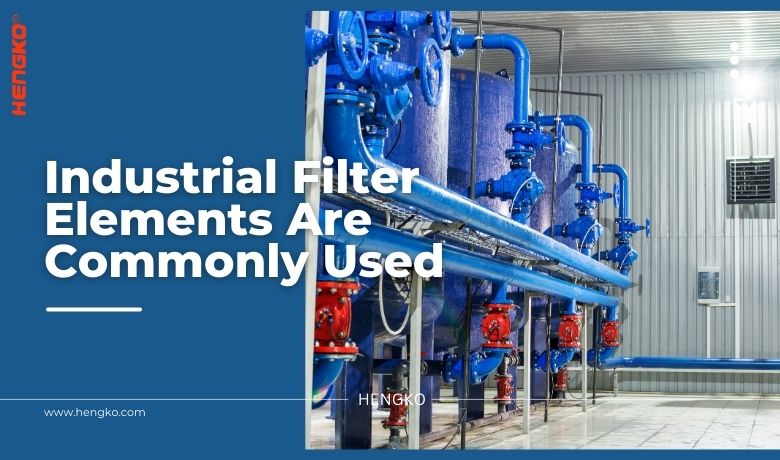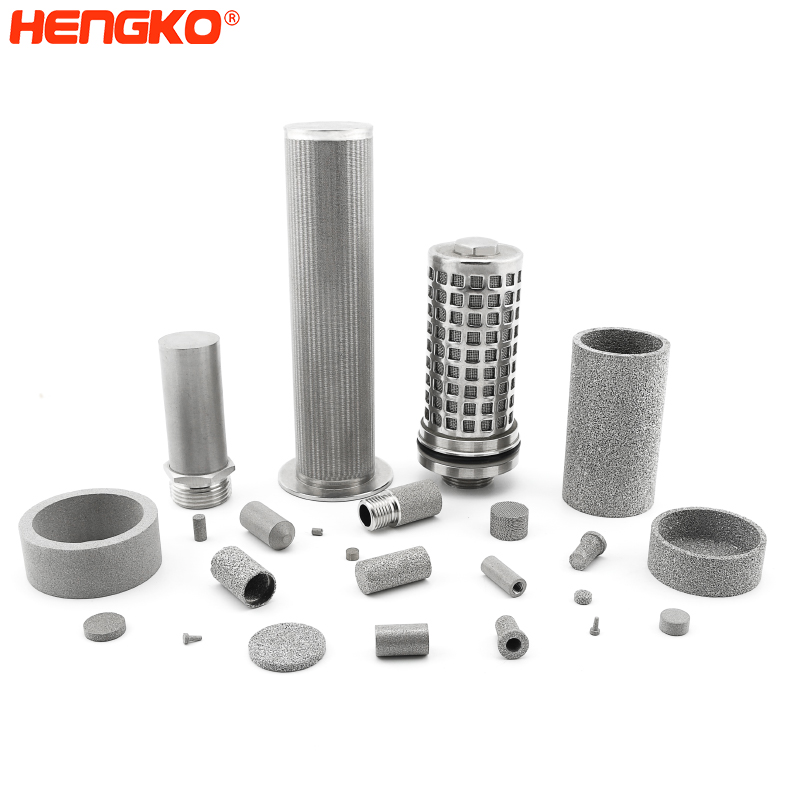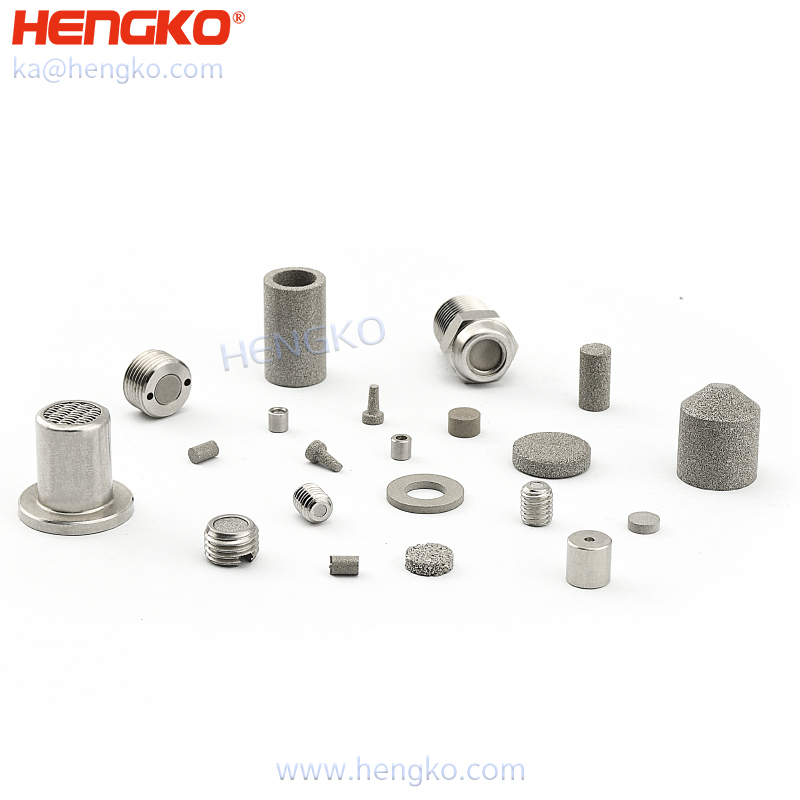Do You Know What Industrial Filter Elements Are Commonly Used?

Welcome to the world of industrial filtration! Ever wondered what keeps our industries running smoothly and efficiently?
Well, the secret is often hidden in the small parts like filter elements that play a big role in maintaining the quality and longevity of machinery.
There are many kinds of filter elements used in the industry. Different industrial requirement needs different functional industrial filter element.
So what are the common industrial filter elements? Next, we will let you know it.
Why It is Importance of Industrial Filtration
Imagine driving a car without ever changing its oil filter. Sounds disastrous, right?
In an industrial setting, filter elements serve a similar crucial role. They help in eliminating contaminants from various mediums like air, water, oil, and thus ensuring the smooth operation of industrial machinery and systems.
1. Wire wound filter element
It is made by the textile fiber yarn with good filtration performance on the porous skeleton via wrapping. It has the advantage of high filtering accuracy high flow, small differential pressure, high compressive strength, a large amount of pollution, poisonless and tasteless and no secondary pollution. Wire wound filter element mainly used in the filtration field of water, food and chemical, can remove effectively suspended matter, particles from the liquid, etc.
2. PP filter element
PP filter element also named Melt blown Filter. It is a filter medium that uses non-toxic tasteless polypropylene as raw material and made by formed by heating and drawing and receiving. It has the advantage of Uniform aperture, high filtration efficiency, acid and alkali resistance, which are mainly used in the drinking water industry, food industry, water treatment and other related systems.3.EPT-CT
3. EPT-CT
EPT-CT adopts high technology and a process of special technique. It uses high-quality fruit shell carbon and coal activated carbon as raw material with edible grade adhesive. EPT-CT can effectively remove residual chlorine and other radioactive substances in the water, and decolorize the effect of odor removal, which is an ideal new generation product of liquid and air purification industry.
4. Ceramic filter element
The ceramic filter element can reserve beneficial minerals in water and remove effectively sand, bacteria and rust at the same time without blocking. It has an advantage of long service time and excellent filtration effect, mainly used in water purifiers, barrelled water, separate water and other industries. It can also be used in other situations where there are corresponding requirements for water supply.
5. Resin filter element
The resin filter element is a porous and insoluble exchange material. It has excellent adsorption of organic matter and the good effect of removing odors can filter particles and impurities. The resin filter element is mainly used in hard water softening, desalination water, purified water rare element antibiotic extraction, antibiotic extraction, etc.
6. Stainless steel filter element
HENGKO stainless steel filter element is made by 316L powder particle raw material or multi-layer stainless steel wire mesh in high-temperature composite sintering. HENGKO Micro/nano grade small size stainless steel powder sintering filter element has an advantage of smooth and flat inner/outer wall, uniform aperture and good strength. The dimensional tolerance of many types of products can be control between ± 0.05mm. The stainless steel filter element is widely used in environmental protection, petroleum, natural gas, chemical industry, environmental detection, instrumentation, pharmaceutical equipment and other fields.
7. TPF-A
TPF-A is using industrial pure titanium (purity 99.6%) as raw material via high-temperature vacuum sintering. It is a kind of new high-tech product that rises in recent years, widely used in the electronic industry, food and beverage industry, petroleum and chemical industry, water treatment, pharmaceutical industry and environmental protection, seawater desalination field.
The above are some common filter element and their application area, we introduce today. HENGKO Technology Co., Ltd is a high-tech manufacturer which committed to r&d and manufacturing sintered stainless steel filter element, Nickel sintered filter element, high temperature and corrosion resistant sintered metal filter element, micron/nano grade sintered metal filter products and porous new metal material environmental protection purification products. With many years’ careful service, continuous innovation and effort, HENGKO has made good achievements in environmental protection, petroleum, natural gas, chemical industry, instrumentation, medical equipment, machinery and other industries. We looking forward to building steady and extensive strategic cooperation relations with friends from all circles and creat a wonderful further together.
How to Choose the Right Filter Elements
Choosing the right filter element might feel like looking for a needle in a haystack, but it doesn't have to be.
Some key considerations include the operating environment, type of contaminants, flow rate requirements,
and compatibility with the system fluids. It's like selecting the perfect pair of shoes; they need to fit just right!
Maintenance and Replacement of Industrial Filter Elements
Maintenance and replacement of industrial filter elements are critical for ensuring effective, reliable operations. Industrial filters are used in a range of industries, from chemical to food and beverage production, and help to remove impurities, enhancing the safety and efficiency of operations. The following steps will guide you through the process of maintaining and replacing industrial filter elements:
1. Regular Inspection:
Regular inspections help to identify potential issues before they become severe. Look for signs of wear and tear or damage. Examine the pressure drop across the filter, as an increase may signal a clogged or otherwise malfunctioning filter. Some systems may have a gauge or an indicator for this purpose.
2. Scheduled Cleaning:
Even without visible signs of damage, scheduled cleanings can help maintain a filter's performance. The cleaning process will vary depending on the type of filter and what it’s filtering. Some filters can be cleaned with a simple rinse, while others might require specific cleaning agents. Always follow the manufacturer's guidelines when cleaning filter elements.
3. Replacement:
When maintenance isn't enough, or if the filter element has reached the end of its lifespan, it needs to be replaced. Factors like the type of impurities being filtered, the filter's operating conditions, and the specific filter design will determine its lifespan. Always replace the filter element with one of the same type and specifications, unless otherwise advised by a professional or the manufacturer.
4. Proper Disposal:
Used filter elements should be disposed of in an environmentally friendly manner, following local regulations and guidelines. Some filters might contain trapped harmful substances that need to be handled appropriately.
5. Keep Spare Filter Elements:
Having spare filter elements on hand can minimize downtime when replacements are needed. This is particularly important for filters that need frequent replacements or are critical to your operations.
6. Regular Filter System Review:
Regular reviews of the entire filter system can help identify possible improvements. This could involve upgrading to a newer filter technology or optimizing the cleaning and replacement schedule based on usage and observed performance.
7. Consult the Manufacturer or Professional Service:
When in doubt, consulting the filter manufacturer or a professional service can provide the necessary guidance. They can help with troubleshooting, recommendations for replacements, and advice on optimizing your maintenance routine.
It's crucial to follow all safety procedures during maintenance and replacement of industrial filter elements. This might include turning off and isolating the system, wearing appropriate personal protective equipment (PPE), and following lockout-tagout (LOTO) procedures. Always refer to the specific safety guidelines provided by your organization or the filter manufacturer.
How to Optimize Industrial Filtration Processes
Industrial filtration is a critical process in many industries, such as pharmaceuticals, chemicals, oil and gas, food and beverages, and more. The purpose of filtration is to remove unwanted particles or contaminants from a fluid or air stream to improve the quality of the end product, protect equipment, and comply with health and safety standards.
Here are several ways to optimize industrial filtration processes:
1. Understand Your Filtration Requirements:
Each process has unique filtration needs. You must understand the nature of your fluid or gas, the contaminants you need to remove, and the quality level you need to achieve. This information will help you choose the right filter types, materials, and pore sizes.
2. Regularly Monitor and Maintain Your Filters:
Frequent checks will help identify issues before they become problems. Monitor pressure drops across the filters, which can indicate when a filter is becoming clogged and needs to be cleaned or replaced. Regular maintenance can also prolong the life of your filters and reduce costs in the long run.
3. Automate the Filtration Process:
Automated filtration systems can significantly enhance efficiency. These systems can automatically adjust filtration parameters, conduct regular checks, and alert operators when maintenance or replacements are required.
4. Optimize Filtration Cycles:
Understanding the optimum time to clean or replace filters can save on energy, filter costs, and downtime. This could involve analyzing data from the filtration process, including pressure drops, flow rates, and contaminant levels, and using this to develop an optimized filtration schedule.
5. Utilize High-Quality Filters:
Higher quality filters may have a higher upfront cost, but they often have longer service lives, better performance, and lower maintenance needs, which can save money and time over the long term.
6. Train Your Staff:
Proper training can ensure your staff know how to maintain and operate the filtration systems correctly. This can reduce mistakes, enhance system performance, and ensure safety.
7. Regular System Reviews and Upgrades:
Technology is always evolving. Regularly review your system and consider whether newer filtration technologies or upgrades could offer better performance or efficiency.
8. Consult with Filtration Experts:
Filtration experts or consultants can provide valuable insights into your filtration process and help you identify areas for improvement. They can also help you stay up to date with the latest filtration technologies and industry best practices.
9. Ensure Environmental Compliance:
Ensure your process adheres to environmental regulations. Efficient filtration can reduce waste and emissions, which can contribute to sustainability goals and lower the risk of non-compliance penalties.
By implementing these strategies, you can optimize your industrial filtration processes, improving efficiency, product quality, and profitability.
The Future of Industrial Filtration
Industrial filtration is a constantly evolving field with advancements driven by technological breakthroughs, changing environmental regulations, and the ongoing quest for operational efficiency. Here's a look at potential trends and advancements that might shape the future of industrial filtration:
1. Increasing Automation and Digitalization:
The trend towards automation and digitalization in industrial processes will likely extend to filtration. Sensors can provide real-time monitoring of filter performance, detecting when filters need cleaning or replacement. Advanced control systems can automate these processes, reducing downtime and human error. Data analysis and predictive maintenance, powered by machine learning algorithms, can further optimize filter use and maintenance schedules.
2. Sustainable Filtration Materials:
As industries strive to reduce their environmental impact, there's an increasing interest in filters made from sustainable, biodegradable, or recyclable materials. The development and implementation of these green filter materials could significantly reduce the environmental footprint of industrial operations.
3. Nanotechnology:
Nanotechnology has the potential to revolutionize filtration processes. Nano-filter membranes can offer superior filtration performance, removing even the tiniest contaminants. This could be particularly valuable in industries such as pharmaceuticals or water treatment, where very high levels of purity are required.
4. Energy-efficient Filtration Systems:
Energy efficiency is becoming increasingly important in all aspects of industrial operations, including filtration. The development of more energy-efficient filtration systems, that maintain high performance while reducing energy use, will be a key focus. This could involve innovations in filter design, as well as the use of more energy-efficient pumps and motors.
5. Advances in Biofiltration:
Biofiltration, which uses microorganisms to filter contaminants, is becoming an increasingly attractive option for many industries. It's environmentally friendly and can be particularly effective for treating certain types of waste, including volatile organic compounds (VOCs) and odorous emissions. Continued advancements in our understanding of microbiology could drive further improvements in biofiltration technology.
6. Smart Filters:
Smart filters with integrated IoT (Internet of Things) technology could be a significant part of the future. These filters could not only indicate when replacement is needed but also provide information about the type and amount of particles they have filtered. This data could be used to optimize filtration processes and provide valuable insights into the process stream.
In conclusion, the future of industrial filtration will likely be shaped by technology and sustainability trends. Businesses that stay on top of these trends and are willing to invest in new filtration technologies can gain a competitive edge. It's an exciting time in the field of industrial filtration, with many opportunities for innovation and improvement.
Frequently Asked Questions
1. What is an industrial filter element?
An industrial filter element is the core component of a filtration system. It is designed to remove particulate matter, impurities, or specific substances from a fluid or gas stream. These elements can be composed of various materials, including paper, fabric, mesh, ceramics, and even metal, depending on the application. They can be found in a range of industries, from oil and gas to food and beverage, pharmaceuticals, and more.
2. How often should I replace my industrial filter elements?
The frequency of replacement depends on several factors including the type of filter, the nature of the substance being filtered, operating conditions, and the specific requirements of your process. Some filters might require replacement every few weeks, while others could last for months. Regular monitoring of filter performance, particularly looking for increased pressure drop or reduced flow rate, can help determine when a filter element needs to be replaced.
3. Can filter elements be cleaned and reused?
Some types of industrial filter elements can indeed be cleaned and reused. For instance, certain wire mesh filters and some types of cartridge filters can be cleaned by backflushing or using appropriate cleaning agents. However, it's essential to follow the manufacturer's instructions to ensure the cleaning process does not damage the filter or reduce its effectiveness. It's also crucial to know that not all filter elements are designed for reuse, and trying to clean a disposable filter could impair its function.
4. How does a filter element work?
A filter element operates on the principle of allowing a fluid or gas to pass through while blocking unwanted particles or contaminants. The specifics can vary with the type of filter. For instance, in a surface filter, the particles are captured on the surface of the filter medium. In a depth filter, the particles are captured within the filter medium itself. The filter medium's pores are sized to capture particles of a specific size, allowing smaller particles to pass through.
5. How do I choose the right filter element for my process?
Choosing the right filter element requires understanding your process's specific needs. You need to know the type of fluid or gas you're filtering, the nature and size of the contaminants you need to remove, and the level of purity you need to achieve. The operating conditions, such as temperature and pressure, are also essential considerations. It's often helpful to work with a filtration professional or the filter manufacturer, who can guide you through the selection process.
6. What are the environmental considerations with filter elements?
Environmental considerations can be significant in the selection and use of filter elements. This can include choosing filter elements made from sustainable or recyclable materials, ensuring used filter elements are disposed of correctly, and using filtration processes that minimize energy use. It's also important to consider the environmental impact of any substances removed by the filter and ensure they are handled and disposed of responsibly.
7. How does the efficiency of a filter element impact my process?
The efficiency of a filter element can have a significant impact on your process. High-efficiency filters can remove more contaminants, which can improve the quality of your final product, extend the lifespan of your equipment, and reduce maintenance costs. However, very high-efficiency filters often have a higher initial cost and can lead to increased pressure drop, which could increase energy use. Therefore, it's essential to balance efficiency with these other considerations.
If you have more questions about industrial filter elements, or if you're interested in optimizing your filtration processes,
don't hesitate to reach out to us at HENGKO. Our team of experts is ready to help guide you towards the best solutions
for your specific needs. To start the conversation, please email us at ka@hengko.com. We look forward to assisting you
with your industrial filtration needs. Let's create cleaner, more efficient processes together.


